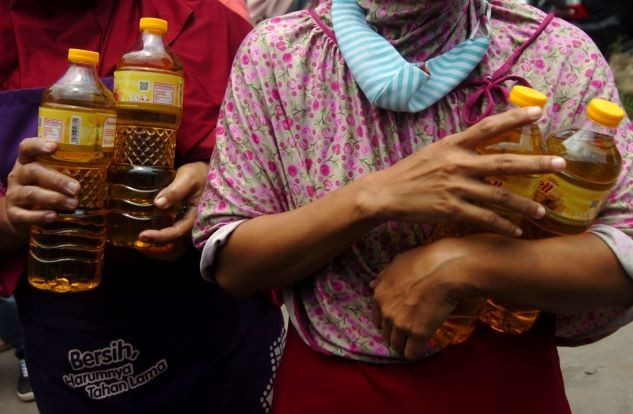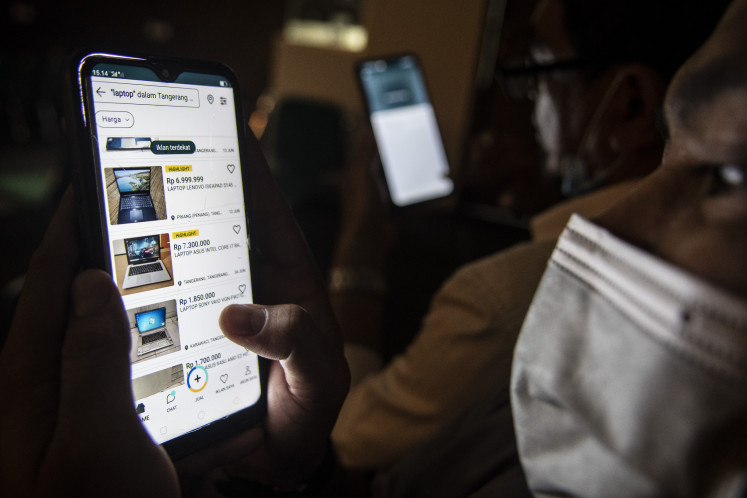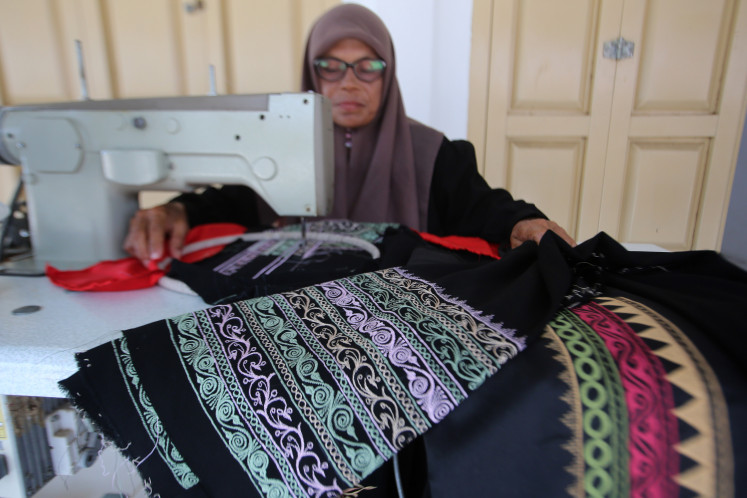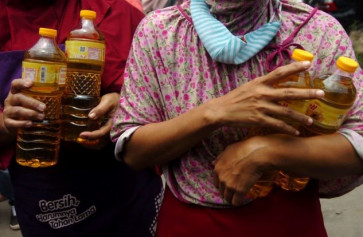Popular Reads
Top Results
Can't find what you're looking for?
View all search resultsPopular Reads
Top Results
Can't find what you're looking for?
View all search resultsAnalysis: Govt adopts another ill policy over scarcity of cheap cooking oil
Change text size
Gift Premium Articles
to Anyone
 Oiled up: Residents carry bottles of cooking oil during a market operation conducted by the Trade Ministry at Trayeman traditional market in Tegal, Central Java, on Monday. Each household was entitled to 1.2 liters of cooking oil at a price of Rp 14,000 (98 US cents) per liter. (Antara/Oky Lukmansyah)
Oiled up: Residents carry bottles of cooking oil during a market operation conducted by the Trade Ministry at Trayeman traditional market in Tegal, Central Java, on Monday. Each household was entitled to 1.2 liters of cooking oil at a price of Rp 14,000 (98 US cents) per liter. (Antara/Oky Lukmansyah)
T
he government has decided to increase the portion of domestic market obligation (DMO) of crude palm oil (CPO), the raw material of cooking oil, and slow down CPO exports to reign in the recent hike of government-sponsored, simple-packaged cooking oil Minyakita. The antimarket policy has irked industry players as it will again punish them more.
Minyakita prices have increased from the government-set retail price of Rp 14,000 (about US$1) a kilo to as high as Rp 20,000 a kilo. In some places, Minyakita even disappear from retail shelves. The government has attributed Minyakita’s price increase and scarcity to its popularity among consumers, including those of the middle class, because of its good quality but much cheaper prices, when compared with premium brands of cooking oil. Minyakita is actually intended for poor people and lower-middle class customers.
Not only that, Trade Minister Zulkifli Hasan recently found 515 tonnes of Minyakita hoarded in a warehouse belonging to PT Bina Karya Prima (BKP), the largest producer of Minyakita. Coordinating Maritime Affairs and Investment Minister Luhut Binsar Pandjaitan was furious with the finding and told the National Police’s food task force to take action against BKP. If the company was found guilty, Luhut said the government would “close down” the company.
Luhut, tasked by President Joko “Jokowi” Widodo to handle the cooking oil debacle, then convened an emergency coordination meeting with the trade minister, the police’s food task force and the industry minister to devise a policy to prevent future supply shocks of Minyakita, especially during the Muslim fasting month of Ramadan and Idul Fitri festival.
Luhut said after the meeting that all those in attendance agreed to increase CPO allocations for domestic market by 50 percent from 300,000 to 450,000 tonnes per day. To ensure enough domestic supply of CPO, Luhut told the trade minister to use the Indonesia National Single Window to hold up 66 percent of CPO export licenses until April, when Idul Fitri celebration occurred. Minister Zulkifli Hasan added that the government would limit the purchase of Minyakita to 5 kilos per person, while those buying more than that would be required to show their ID cards, and still they would be limited to 10 kilos each.
The government’s antimarket policy of increasing the DMO and slowing down exports was met with criticism from the Indonesian Palm Oil Council (DMSI). DMSI acting chairman Sahat Sinaga suggested that the government assigned state-owned food companies to take over the production of Minyakita from private companies and assign the State Logistics Agency (Bulog) to take over the distribution of Minyakita to solve the current cooking oil fiasco.
Sahat believed that if the production and distribution of Minyakita were carried out by state-owned companies, there would no longer be price fluctuations or scarcity of Minyakita, and no more hassle for customers having to show their ID cards just to buy Minyakita. When the government is in control of Minyakita, it would not need to adopt the DMO or export restrictions on CPO.


















